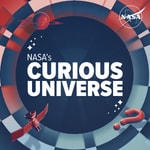NASA's Curious Universe – Details, episodes & analysis
Podcast details
Technical and general information from the podcast's RSS feed.

NASA's Curious Universe
National Aeronautics and Space Administration (NASA)
Frequency: 1 episode/23d. Total Eps: 85

Recent rankings
Latest chart positions across Apple Podcasts and Spotify rankings.
Apple Podcasts
🇬🇧 Great Britain - science
13/08/2025#34🇺🇸 USA - science
13/08/2025#57🇬🇧 Great Britain - science
12/08/2025#35🇺🇸 USA - science
12/08/2025#56🇬🇧 Great Britain - science
11/08/2025#32🇺🇸 USA - science
11/08/2025#58🇬🇧 Great Britain - science
10/08/2025#37🇺🇸 USA - science
10/08/2025#54🇬🇧 Great Britain - science
09/08/2025#47🇺🇸 USA - science
09/08/2025#67
Spotify
No recent rankings available
Shared links between episodes and podcasts
Links found in episode descriptions and other podcasts that share them.
See allRSS feed quality and score
Technical evaluation of the podcast's RSS feed quality and structure.
See allScore global : 69%
Publication history
Monthly episode publishing history over the past years.
Cosmic Dawn with Nobel Laureate John Mather
Season 10 · Episode 1
mercredi 4 juin 2025 • Duration 18:47
Earth Series: What's Next for NASA Earth Science
Season 9 · Episode 5
mardi 20 mai 2025 • Duration 28:51
Why the Moon’s Icy South Pole is a Hot Target for NASA
Season 8 · Episode 5
mardi 21 janvier 2025 • Duration 37:24
The Mind-Bending Math Inside Black Holes
Season 8 · Episode 4
mardi 17 décembre 2024 • Duration 26:43
How Open Science and AI Are Advancing Hurricane Research
Season 8 · Episode 3
mardi 12 novembre 2024 • Duration 32:36
Europa Clipper's Voyage to Jupiter's Ocean Moon
Season 8 · Episode 2
mardi 1 octobre 2024 • Duration 36:53
An Asteroid by Any Other Name With Special Guest Latif Nasser
Season 8 · Episode 1
mardi 17 septembre 2024 • Duration 39:23
Sun Series: Bonus: Dispatches from the Path of Totality
Season 7 · Episode 8
vendredi 3 mai 2024 • Duration 36:27
Sun Series: Soaring Toward the Sun
Season 7 · Episode 7
mardi 23 avril 2024 • Duration 36:35
Sun Series: What is Space Weather?
Season 7 · Episode 6
mardi 16 avril 2024 • Duration 35:14